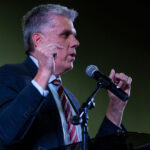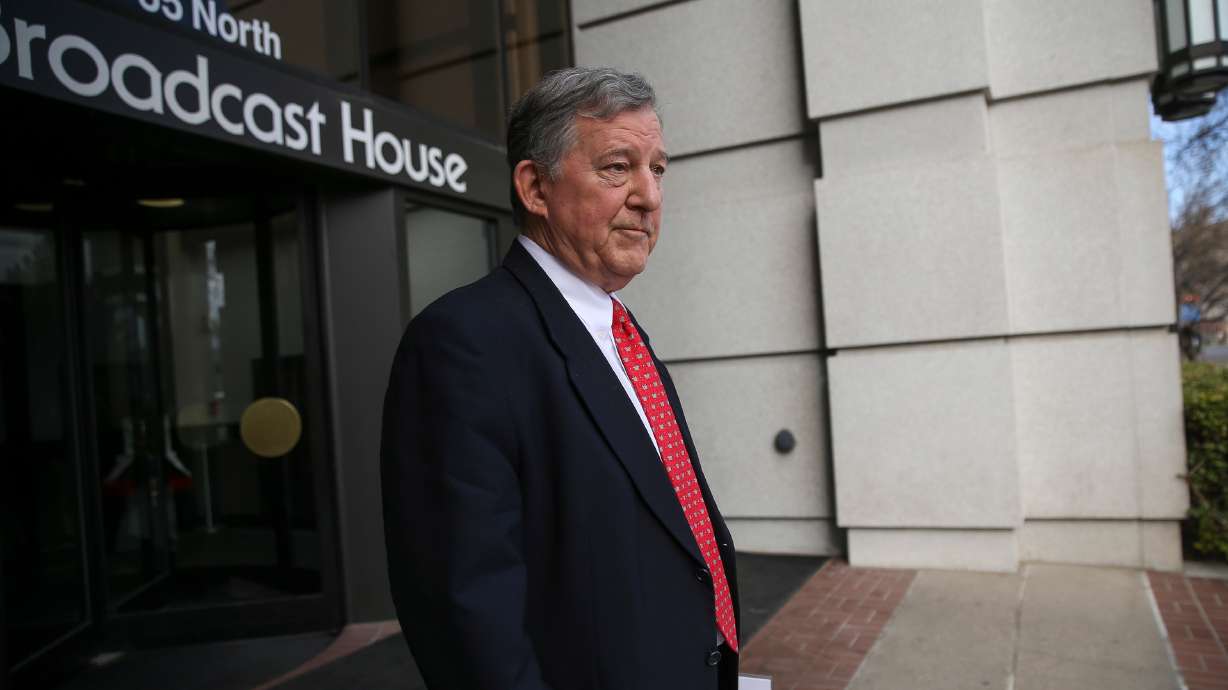Incumbent Republicans forced into primaries in drawn-out GOP state convention
Apr 27, 2024, 5:15 PM | Updated: Apr 28, 2024, 11:26 am
SALT LAKE CITY — Several challengers to incumbent Republicans forced primary races during the Republican state nominating convention on Saturday — a lengthy and at times vitriolic affair that prompted rebukes from some prominent party members.
The day began just after dawn at the Salt Palace Convention Center in Salt Lake City with thousands of delegates packed into the expo hall in snaking registration lines that took hours for some delegates to navigate. Several brouhahas over party rules and voting procedures further pushed back the official proceedings, and the party blew past its anticipated end time of 6 p.m. — adjourning just shy of midnight as the party’s contract on the convention center ran out.
A trio of prominent incumbents — Gov. Spencer Cox, Rep. Celeste Maloy and Rep. Blake Moore — were defeated by challengers but will advance to primary elections nonetheless. In Cox’s case, his convention performance was effectively moot as he had already collected the signatures required to qualify, while Maloy narrowly escaped being unseated by Colby Jenkins, an insurgent endorsed by Sen. Mike Lee.
Moore was also defeated by challenger Paul Miller during the convention, meaning the two will advance to the primary.
Although Cox lost overwhelmingly to state Rep. Phil Lyman on Saturday, incumbent Utah governors have a history of falling to convention challengers only to glide to reelection in the primary. Former Gov. Gary Herbert earned only 44% of the delegate vote in 2016, but defeated his opponent with more than 72% of the primary vote.
Two of the most high-profile races — for open seats in the Senate and 3rd Congressional District — also ended without a final resolution, as a handful of candidates in each race have already qualified for the primary.

Trent Staggs, who is running for U.S. Senate, speaks at the Utah Republican Party state nominating convention a the Salt Palace Convention Center in Salt Lake City on Saturday. (Megan Nielsen, Deseret News)
Trump endorsement boosts Trent Staggs
Senate candidate and Riverton Mayor Trent Staggs received a boost to his campaign after receiving an unexpected endorsement from the presumptive presidential nominee and de facto leader of the Republican party: former President Donald Trump.
That endorsement likely helped Staggs jump out to an early lead before locking up the delegate vote which concluded close to midnight. Staggs’ convention victory shut the door on the campaigns for Brent Orrin Hatch, Carolyn Phippen and several others of the 10 candidates, but the mayor will face three opponents in a GOP primary: Former House Speaker Brad Wilson, businessman Jason Walton and current 3rd Congressional District Rep. John Curtis have already qualified.
Trump posted an endorsement of Staggs on social media Saturday morning, backing the self-described “America First” candidate for the seat soon to be vacated by Sen. Mitt Romney.
“Trent Staggs is 100% MAGA, and is running to fill The Mitt Romney, a Total Loser, Seat as the next Senator from the Great State of Utah!” Trump posted on Truth Social. “A Highly Successful Entrepreneur, who has served brilliantly as Mayor of Riverton for the past six years, Trent knows how to Create Jobs, Stop Inflation, Grow the Economy, and Secure the Border,” he wrote, in part.
Celeste Maloy hangs on
Utah’s newest member of Congress narrowly earned enough support from delegates to avoid losing her seat and will advance to the June primary election.
Maloy, who is seeking her first full term in Congress, received 43.15% of the vote compared to 57.85% for challenger Colby Jenkins, a combat veteran.
Jenkins had scored a high-profile endorsement from Sen. Mike Lee, who joined him on stage at Saturday’s convention, but it wasn’t enough for Jenkins to eliminate Maloy at the convention. Instead, they will face off in the primary.
“Representing you is a sacred privilege, and I don’t take it for granted,” said Maloy, who won the special election last year to replace former Rep. Chris Stewart when he resigned from Congress. “That’s why I refuse to be a rubber stamp. I will not bow down to anyone. I’m not going to bow down to the party, to leadership, to the media, or to a senator.”
Utah Republican legislative candidates advance out of state convention
Lee touted Jenkins, a St. George resident who works for a telecommunications company and is a colonel in the U.S. Army Reserve, as “a warrior” who will make a difference in Washington, D.C. Lee highlighted Jenkins’ background as a West Point graduate and a Green Beret.
In his speech, Jenkins criticized Maloy for her votes to reauthorize the Foreign Intelligence Surveillance Act and an omnibus spending bill. He also alluded to his military service in making his pitch for support.
“I have hope that at some point, if I’m fortunate to be deployed to the congressional battlefield, I might once again be safeguarded by God in defense of our Constitution and our nation,” Jenkins said.
While Jenkins had the support of Lee, Maloy was joined on stage by 4th District Rep. Burgess Owens, who’s also popular with GOP delegates. Owens did not face a challenger and moved on to the general election.

Phil Lyman, governor candidate, speaks during the Utah Republican Party state nominating convention at the Salt Palace Convention Center in Salt Lake City on Saturday, April 27, 2024. (Marielle Scott, Deseret News)
Gubernatorial primary field set
The field of candidates for the Republican nomination for governor was whittled down Saturday afternoon, setting up a primary between Lyman and incumbent Cox.
Delegates at the convention loudly booed Cox as he took the stage smiling ahead of his speech as a candidate.
“I love you guys,” Cox said over the boos, before listing off a series of accomplishments from his first term in office. Of the opposition, he said, “Maybe you hate that I signed the most pro-life legislation in Utah history,” among other conservative priorities.
“But maybe you just hate that I don’t hate enough,” he added.
Lyman took the stage to raucous applause and pointed to his 10-day incarceration after he was convicted of leading an illegal ATV protest on federally protected lands. Lyman was later pardoned by then-President Trump.
“All of us have a feeling of what it’s like to be in a prison,” he said, referring to the COVID-19 pandemic, before railing against illegal immigration and calling for an end to the signature-gathering path to the ballot.
Three other candidates — Carson Jorgensen, Scott Robbins and Sylvia Miera-Fisk — were eliminated in the first round of voting. Cox and Lyman advanced to a second round, which Lyman won with 67.5% of the delegate vote.
Because Cox has qualified for the June 25 primary by gathering signatures, he will face Lyman in a two-man race for the GOP nomination.

Utah Gov. Spencer J. Cox speaks during the Utah Republican Party state nominating convention at the Salt Palace Convention Center in Salt Lake City on Saturday. (Marielle Scott, Deseret News)
Trump backs Utah Senate candidate
The Utah Republican Party nominating convention kicked off late Saturday morning, after thousands of delegates convened at the Salt Palace Convention Center in Salt Lake City to select nominees for the 2024 election.
Official business at the convention was delayed into the afternoon after multiple delegates confronted party leaders asking to vote by paper ballot, instead of the electronic balloting system, and several others complained about the lengthy process to check in in the morning.
Delegates voted on several statewide races first, beginning with auditor and attorney general before moving on to the gubernatorial race. Treasurer Marlo Oaks is the only Republican in the race and gave a short speech before officially advancing to the general election.
Senate candidate and Riverton Mayor Trent Staggs received a boost to his campaign after receiving an unexpected endorsement from the de facto leader of the Republican party: Trump.
The former president posted an endorsement for Staggs on social media Saturday morning, backing the self-described “America First” candidate for the seat soon to be vacated by Sen. Mitt Romney.
“Trent Staggs is 100% MAGA, and is running to fill The Mitt Romney, a Total Loser, Seat as the next Senator from the Great State of Utah!” Trump posted on Truth Social. “A Highly Successful Entrepreneur, who has served brilliantly as Mayor of Riverton for the past six years, Trent knows how to Create Jobs, Stop Inflation, Grow the Economy, and Secure the Border. As your next Senator, Trent will help us Unleash American Energy, Support our Military/Vets, and Protect our always under siege Second Amendment. Trent Staggs has my Complete and Total Endorsement – He will be a GREAT Senator, and never let you down!”
Staggs is one of 10 Republicans seeking the U.S. Senate seat, three of whom have already qualified for the primary by collecting signatures.
Other closely watched races include the campaign for the 3rd Congressional District seat, as well as Cox’s campaign for reelection.
The convention is expected to last most of the day, and the high-profile races are slated to be considered last.
Some Republicans call out lack of decorum
Saturday’s convention was at times heated — with loud outbursts from delegates, such as during the governor’s speech — which led some Republicans to criticize the lack of decorum.
Cox’s running mate, Lt. Gov. Deidre Henderson, posted on the social platform X that the convention is “no longer a family friendly environment.”
“I’m mortified by the vulgarity and viciousness my young nieces were exposed to by another gubernatorial campaign’s supporters,” Henderson wrote. “It’s embarrassing, sad, and clearly no longer for kids.”
The GOP convention is no longer a family friendly environment. I’m mortified by the vulgarity and viciousness my young nieces were exposed to by another gubernatorial campaign’s supporters. It’s embarrassing, sad, and clearly no longer for kids. pic.twitter.com/2PJUE0x3Lx
— Deidre Henderson (@DeidreHenderson) April 28, 2024
Holly Richardson, a former Republican state lawmaker and current editor of Utah Policy, also posted on social media about this year’s convention environment.
“I have been coming to conventions for 22 years. This is the worst I’ve ever seen,” Richardson wrote. “Anger, contempt, lack of decorum. I’ve sat near some first-time delegates who are shocked and dismayed. They probably won’t run again and I don’t blame them.”
Cox reposted both Henderson and Richardson’s posts from his personal account on X.
The Utah Democratic Party also held its nominating convention Saturday, and the Utah Forward Party held its inaugural convention after its formation last year. The United Utah Party advanced several candidates — Vaughn Cook for the 4th Congressional District, and Michelle Quist for attorney general — during its convention last weekend.
Rep. Blake Moore loses convention vote
Moore, a member of House Republican leadership, was another incumbent who lost the delegate vote, but secured his place on the primary ballot by collecting signatures. Moore faced a pair of challengers, and while he won a plurality in the first round of balloting, Paul Miller took nearly 55% of the vote in the second round.
Utah Republican Party results:
Senate, first round of voting:
- Trent Staggs: 42.64%
- Rep. John Curtis: 21.7%
- Carolyn Phippen: 13.06%
- Brad Wilson: 7.69%
- Jason Walton: 7.12%
- Brent Orrin Hatch: 3.4%
- Chandler Tanner: 2.61%
- Josh Randall (eliminated): 1.49%
- Brian Earl Jenkins (eliminated): 0.16%
- Jeremy Lewis Friedbaum (eliminated): 0.13%
Senate, second round of voting:
- Trent Staggs: 51.68%
- Rep. John Curtis: 22.47%
- Carolyn Phippen: 11.71%
- Brad Wilson: 5.56%
- Jason Walton: 4.57%
- Chandler Tanner (eliminated): 2.27%
- Brent Orrin Hatch (eliminated): 1.74%
Senate, third round of voting:
- Trent Staggs: 57.68%
- John Curtis: 24.67%
- Carolyn Phippen (eliminated): 9.34%
- Brad Wilson (eliminated): 4.86%
- Jason Walton (eliminated): 3.46%
Senate, final round of voting:
- Trent Staggs: 69.74%
- John Curtis: 30.26%
Staggs handily won the delegate vote, and will advance to face Walton, Wilson and Curtis, all of whom collected signatures.
3rd Congressional District, first round of voting:
- Mike Kennedy: 38.59%
- JR Bird: 17.98%
- John Dougall: 8.20%
- Zac Wilson: 7.89%
- Kathryn Dahlin: 7.89%
- Stewart Peay: 7.26%
- Chris Herrod: 6.73%
- Case Lawrence (eliminated): 5.05%
- Lucky Bovo (eliminated): 0.42%
3rd Congressional District, second round of voting:
- Mike Kennedy: 44%
- JR Bird: 20%
- Zac Wilson: 9.19%
- Kathryn Dahlin: 8.22%
- John Dougall: 7.03%
- Stewart Peay: 6.7%
- Chris Herrod (eliminated): 4.86%
3rd Congressional District, third round of voting:
- Mike Kennedy: 52.39%
- JR Bird: 19.13%
- Zac Wilson: 9.68%
- Kathryn Dahlin: 8.68%
- Stewart Peay: 5.23%
- John Dougall (eliminated): 4.89%
3rd Congressional District, fourth round of voting:
- Mike Kennedy: 55.28%
- Zac Wilson: 18.58%
- JR Bird: 14.35%
- Kathryn Dahlin (eliminated): 8.12%
- Stewart Peay (eliminated): 3.67%
3rd Congressional District, fifth round of voting:
- Mike Kennedy: 59.59%
- Zac Wilson: 25.52%
- JR Bird (eliminated): 14.9%
3rd Congressional District, final round of voting:
- Mike Kennedy: 61.51%
- Zac Wilson (eliminated): 38.49%
Zac Wilson, the chairman of the Utah Young Republicans, earned support from several candidates in the race as they were knocked off, but the support wasn’t enough to avoid being narrowly eliminated in the sixth and final round of votes. Kennedy will advance to a primary election against Bird, Lawrence, Peay and Dougall, who all qualified by collecting signatures.
2nd Congressional District:
- Colby Jenkins: 56.85%
- Rep. Celeste Maloy: 43.15%
Both advance to the June primary election.
1st Congressional District, first round of voting:
- Rep. Blake Moore: 45.29%
- Paul Miller: 33.56%
- Derek Draper (eliminated): 21.15%
1st Congressional District, final round of voting:
- Paul Miller: 54.86%
- Rep. Blake Moore: 45.14%
Both the incumbent Moore and Miller advanced to the GOP primary in June, as neither received 60% from delegates.
Governor, first round of voting:
- Phil Lyman: 44.24%
- Gov. Spencer Cox: 28.86%
- Carson Jorgensen (eliminated): 25.80%
- Scott Robbins (eliminated): 0.56%
- Sylvia Miera-Fisk (eliminated): 0.53%
Governor, final round of voting:
- Phil Lyman: 67.54%
- Gov. Spencer Cox: 32.46%
Sylvia Miera-Fisk, Carson Jorgensen and Scott Robbins were eliminated in the first round of voting. Cox has already qualified for the primary, setting up a two-man race against Lyman.
Attorney general, first round of voting:
- Frank Mylar: 42.83%
- Rachel Terry: 31.47%
- Derek Brown (eliminated): 16.7%
- Trent Christensen (eliminated): 9%
Attorney general, final round of voting:
- Frank Mylar: 59.76%
- Rachel Terry: 40.24%
Rachel Terry and Frank Mylar will both advance to a primary after Mylar narrowly fell short of the 60% threshold to advance as the party’s candidate. Derek Brown was eliminated during the first round of voting, but has already qualified for the primary by collecting signatures. Trent Christensen was eliminated during the first round of voting and is out of the race.
State auditor:
- Ricky Hatch: 51.31%
- Tina Cannon: 48.69%
Neither candidate collected signatures to qualify for a primary ballot, and because neither earned 60% of the delegate vote, both will stay alive for a Republican primary.
Utah Democratic Party results:
The Utah Democratic Party also held its nominating convention Saturday, with many candidates advancing to the general election uncontested, including Rep. Brian King for governor, Catherine Voutaz for state auditor, Neil Hansen for treasurer, Bill Campbell for 1st Congressional District, Brian Adams for 2nd Congressional District and Glenn Wright for 3rd Congressional District.
In contested races, Caroline Gleich advanced to the general election for the U.S. Senate race, Katrina Fallick-Wang won the contest for the 4th Congressional District nomination and Rudy Bautista is the Democrats’ choice for attorney general.
Here are the full results from Saturday’s major Democratic contests:
Senate:
- Caroline Gleich: 795 votes
- Laird Fetzer-Hamblin: 48 votes
- Archie Williams III: 16 votes
4th Congressional District:
- Katrina Fallick-Wang: 117 votes
- Jonathan Lopez: 59 votes
Utah attorney general:
- Rudy Bautista: 511 votes
- David Carlson: 282 votes





















